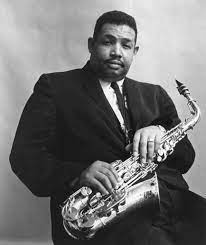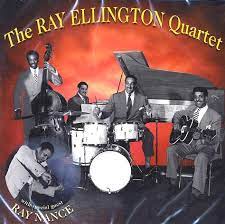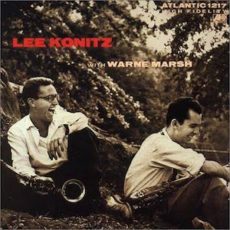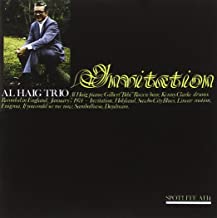
Three Wishes
Julian “Cannonball” Adderley told the Baroness that his three wishes were:
- “I wish that racial discrimination would be eliminated from the face of the earth, in all directions.”
- “I wish for some sort of subsidy for the jazz art, so that those truly dedicated artists may create music, let’s say unscathed or distorted because of social and economic necessity. Only under these circumstances may there exist jazz expression free from bitterness, jealousy, grief, and the put-down syndrome.”
- “I must honestly confess that I would wish for certain various and sundry circumstances indigenous to healthy and happy home life for my wife and myself.”
More Posts: baroness,history,instrumental,jazz,music,pannonica,saxophone,three,wishes

Daily Dose Of Jazz…
Lauderic Caton was born on August 31, 1910 in Arima, Trinidad and Tobago was the fourth son and last of the eight children. An autodidact on guitar, which he played professionally from the age of 17, however, he was also proficient on saxophone, double bass, and banjo.
After spending time in Guadeloupe and Martinique, he moved to Europe in 1938, playing in Paris, France with guitarist Oscar Alemán. Soon he was in Brussels, Belgium playing with Ram Ramirez, Jean Omer, Harry Pohl, and Jamaican Joe Smith. While in Antwerp, Belgium he played with Gus Clark and Tommy Brookins.
Influenced by Lonnie Johnson and Charlie Christian, he first began using an amplifier in 1940. Lauderic played in England with Don Marino Barreto and saxophonist Louis Stephenson, with whom he became a frequent collaborator. Together they led a house band at Jig’s Club.
He has worked with Cyril Blake, Johnny Claes, Bertie King, Harry Parry, Dick Katz, and Coleridge Goode. Late in the 1940s Caton played with Ray Ellington and Ray Nance, playing under the pseudonym “Lawrence Rix” for legal reasons. Later in his life he also taught and built custom amplifiers.
Leaving music at the end of the 1950s, he was the musical arranger for Walking on Air. Guitarist Lauderic Caton, who was an early proponent of the use of electric guitar in Britain, particularly in jazz, passed away in London, England on February 19, 1999. He is buried in Port of Spain, Trinidad.
More Posts: history,istrumental,music

Daily Dose Of Jazz…
Horst Konrad “Conny” Jackel was born on August 30, 1931 in Offenbach am Main, Germany. Initially working as a steel construction fitter, he attended the conservatory in 1951 and from 1952 played in the clubs of the US Army in France, the Netherlands and Germany.
In 1955 he became a member of the Helmut Brandt Combo, contributing to its success. In 1959 he went on to perform the equally demanding arrangements of the Media Band of Harald Banter in Cologne. 1961 saw Jackel moving to the Erwin Lehn Orchestra in Stuttgart, where he performed with Miles Davis, Chet Baker, Dizzy Gillespie and Frank Sinatra.
From 1964 to 1969 he was a member of the Hessischer Rundfunk Jazz Ensemble led by Albert Mangelsdorff, then became first trumpet of the orchestra in 1967 under Willy Berking and the HR Big Band under Heinz Schönberger. He would go on to perform with Joki Freund, Rudi Sehring, Attila Zoller, Charly Antolini and the Sugar Foot Stompers among other traditional bands.
Suffering from cancer, he lost his lower jaw to amputation forcing him to give up the trumpet. Occasionally he was active as a drummer with The Bookreaders. After a long illness as a result of an operation, trumpeter and flugelhornist Conny Jackel, whose motto was “No beer – no music!”, passed away on April 28, 2008 in Bad Nauheim, Germany.

Requisites
Lee Konitz With Warne Marsh ~ Lee Konitz & Warne Marsh | By Eddie Carter
This morning’s choice from the library is an album bringing together two of the best musicians from the Cool Jazz school, Lee Konitz on alto sax and Warne Marsh on tenor sax. Lee Konitz With Warne Marsh (Atlantic 1217) was recorded and released in 1955. Ronnie Ball (track: B3), Sal Mosca (tracks: A2, A4 to B2, B4) on piano, Billy Bauer on guitar, Oscar Pettiford on bass, and Kenny Clarke on drums round out the stellar supporting cast. My copy used for this report is the 2018 Speakers Corner Mono audiophile reissue sharing the original catalog number.
Side One begins with Topsy by Edgar Battle and Eddie Durham. Oscar starts an elegant bass introduction segueing into a collective subtle theme minus both pianists. Lee opens with a relaxing informality on a lyrical, soft-spoken statement. Oscar delivers the next reading with exquisite skill and Warne excels on the final solo before both saxes take the closing chorus into a soft climax. The sextet turns the beat upward on There Will Never Be Another You by Harry Warren and Mack Gordon. It opens with a quick collective theme led by Konitz who also cooks briskly on the opening statement. Marsh follows with a passionately assertive solo, then Pettiford delivers something special on the next vigorous reading. Both horns return to share the final solo ahead of the close.
I Can’t Get Started by Vernon Duke and Ira Gershwin tells the story of a man who’s achieved great success in everything, except the affection and love of the woman he desires. Both pianists lay out on this tune also. Lee takes the lead this time with a dreamy melody and reading that’s delicately crafted. Warne approaches the next solo with tender sincerity. Oscar walks a short distance on the closer leading to a gentle exit. Donna Lee by Miles Davis is named for the daughter of bassist Curly Russell and begins with an expedient theme that’s breathtaking. Konitz opens with a very impressive reading, then Mosca takes over for an energetic interpretation. Marsh charges into the next searing statement and Clarke shares a fiery conversation with both saxes into the reprise and abrupt ending.
Side Two opens with Two Not One by Lennie Tristano that gets underway a vibrant opening chorus. Lee takes off first like a jolt of electricity traveling through the body. Warne adds some additional power on an inspired solo as steady as the rock of Gibraltar. Sal responds with an exhilarating reading shadowed closely by both saxes in the background. Kenny shares a brief statement with the principal soloists into the climax. Don’t Squawk is by Oscar Pettiford, a blues he makes his presence felt on the introduction and the melody with the rhythm section. Konitz takes the first solo for a slow stroll, then Mosca swings softly and smoothly into the next interpretation. Marsh also makes his point in a relaxed manner, followed by Pettiford who gives a slow, easy groove gently sailing over the rhythm section.
Ronnie Ball takes over the piano chair on his uptempo original, Ronnie’s Line. Lee begins with an upbeat, energetic theme, then adds exuberant vitality to the opening solo. Ronnie takes the next spot for a swiftly paced statement. Marsh swings into the next performance vigorously, and the front line energizes the closing chorus with a spirited ride ending with an attractive exit. The album ends with a little Background Music by Warne Marsh opening with a collective theme. Lee applies some serious blowing to the opening statement. Sal gives an exhilarating reading next, followed by Warne who executes the third solo with high-voltage precision. Oscar and Kenny exchange their ideas on the finale into a soft summation. Lee Konitz With Warne Marsh was produced by Nesuhi Ertegun and engineered by Tom Dowd.
Speakers Corner reissues are remastered using pure analog components only, from the master tapes through to the cutting head. The soundstage on this album is immense and absolutely stunning, drawing you in completely the moment your stylus touches the lead groove. You don’t just hear the musicians and their instruments; you almost feel their presence in your listening room. In my opinion, the album’s not only remarkable for its musicianship, but an underrated jewel of fiery and relaxed tempos by both saxophonists. If you’re a fan of Cool Jazz and in the mood for some great sax, I invite you to check out, Lee Konitz With Warne Marsh for your library. It’s a terrific album of pure bliss that’s perfect in every way!
~ Tom Dowd – Source: Discogs.com ~ Donna Lee, I Can’t Get Started, There Will Never Be Another You, Topsy – Source: JazzStandards.com © 2021 by Edward Thomas Carter
More Posts: choice,classic,collectible,collector,history,instrumental,jazz,music,saxophone

Daily Dose Of Jazz…
Gilbert Rovère was born on August 29, 1939, Toulon, France and attended the Conservatory of Nice studying the double bass. He becme one of the most in-demand musicians in France in the Sixties.
He appeared and/or recorded with Bud Powell, Dexter Gordon, René Thomas, Jean-Luc Ponty, Barney Wilen, Al Haig, and Steve Grossman among others. For several years during his career Rovère was a member of the Martial Solal Trio with Daniel Humair.
Bibi was hired by Duke Ellington to play a Paris recording session with the orchestra and Alice Babs in 1963. He also hired him the following year to play with one of Duke’s small groups on the Italian Riviera.
Bassist Gilbert ‘Bibi’ Rovère, who received the Prix Django Reinhardt award in 1967, passed away from cancer in southern France on March 13, 2007 in Gorbio, France. He was 67.




